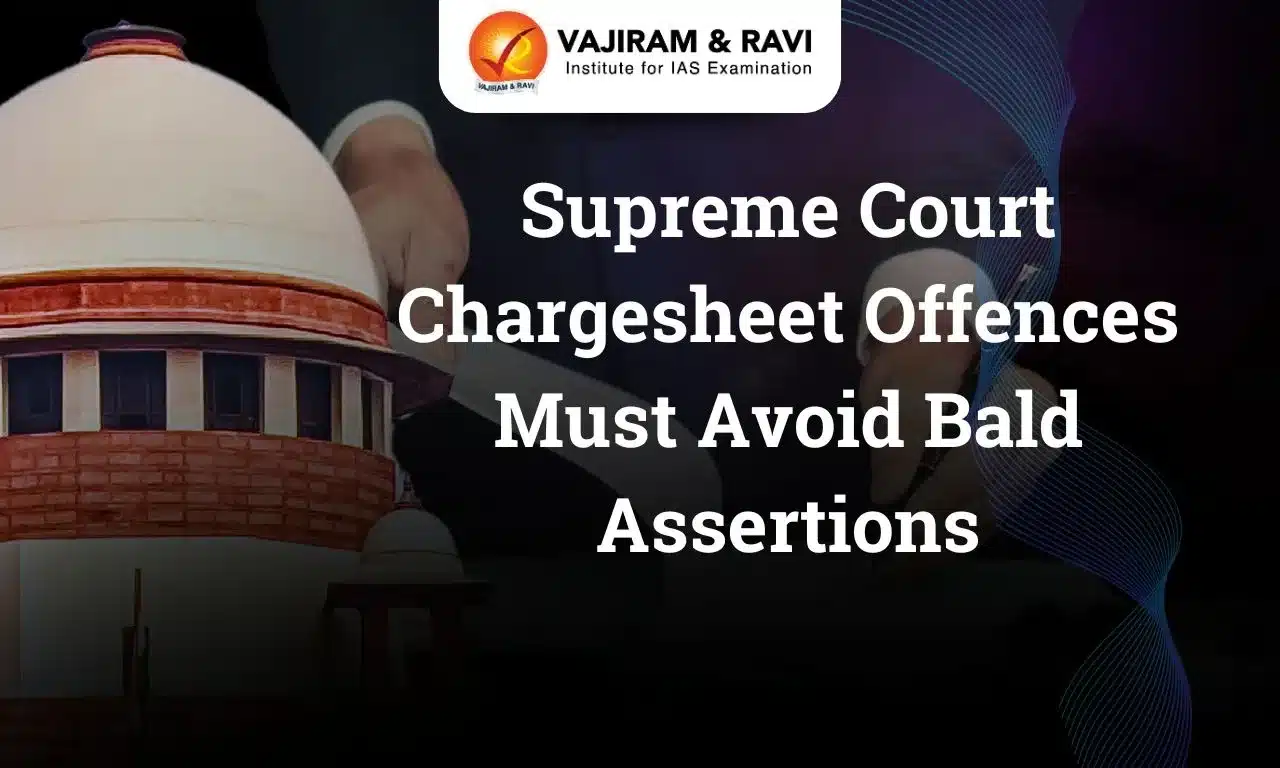About Chargesheet:
- A chargesheet is a final report that is filed by the investigating officer or police officials after the completion of the investigation in a cognizable or non-cognizable case.
- It is also known as the Police report or the Final report.
- It contains all the stringent records right from the commencement of the investigation procedure of lodging an FIR to the completion of the investigation and the preparation of final report.
- The chargesheet has to be prepared and submitted by the police before the court proceedings can begin.
- Once the charge sheet has been submitted to a court of law, prosecution proceedings against the accused begin.
- This report by the investigating officer should be in the form prescribed by the state government.
- Contents of the chargesheet: A chargesheet must contain the following information
- The names of the parties.
- Nature of the information.
- Names of the persons who appear to be acquainted with the events.
- About the offence that appears to have been committed and the person by whom it has been committed.
- Information regarding the arrest of the accused, his/their release with or without sureties, and whether he has been forwarded into custody.
- Benefits of a chargesheet:
- It contains the statements of the accused and all other witnesses.
- Marks the beginning of a criminal trial.
- Charges on which courts have to proceed against the accused are mentioned.
- It is useful for the accused in obtaining bail as the offences are mentioned clearly.
- Time limit for filing a Charge Sheet:
- It is to be filed within 60 days from the date of arrest of the accused in cases triable by lower courts and 90 days in cases triable by the Court of Sessions.
- If the charge sheet is not filed within the prescribed time mentioned above, the accused has a right to default bail.
- Is filing a chargesheet compulsory?
- Filing of a chargesheet in case a cognizable offence is said to be committed by the accused is mandatory on the part of police officials, either by themselves or on the orders of the court, after filing an FIR.
- However, the same is not compulsory in cases where a non-cognizable offence has been committed unless the court orders an investigation.
What is a Cognizable Offence?
- A Cognizable offence or case is defined as one which an officer in-charge of a police station may investigate without the order of a magistrate and effect arrest without a warrant.
- The Police have a direct responsibility to take immediate action on the receipt of a complaint or credible information in such crimes, visit the scene of the crime, investigate the facts, apprehend the offender, and arraign him before a Court of law having jurisdiction over the matter.
- Non-Cognizable crimes are defined as those which cannot be investigated by police without the order of a competent magistrate.
Q1: What is the First Information Report (FIR)?
It is a written document prepared by a Police officer based on information given by an aggrieved person or any other person either in writing or made orally about the commission of a Cognizable Offence. Investigation is started only after filing of the FIR. Anyone can file a FIR, whether it is the victim, victim’s family or friends, or any witness to a crime. An FIR can only be lodged in case of cognizable offences.
Source: LL
Last updated on July, 2025
→ UPSC Notification 2025 was released on 22nd January 2025.
→ UPSC Prelims Result 2025 is out now for the CSE held on 25 May 2025.
→ UPSC Prelims Question Paper 2025 and Unofficial Prelims Answer Key 2025 are available now.
→ UPSC Calendar 2026 is released on 15th May, 2025.
→ The UPSC Vacancy 2025 were released 1129, out of which 979 were for UPSC CSE and remaining 150 are for UPSC IFoS.
→ UPSC Mains 2025 will be conducted on 22nd August 2025.
→ UPSC Prelims 2026 will be conducted on 24th May, 2026 & UPSC Mains 2026 will be conducted on 21st August 2026.
→ The UPSC Selection Process is of 3 stages-Prelims, Mains and Interview.
→ UPSC Result 2024 is released with latest UPSC Marksheet 2024. Check Now!
→ UPSC Toppers List 2024 is released now. Shakti Dubey is UPSC AIR 1 2024 Topper.
→ Also check Best IAS Coaching in Delhi















